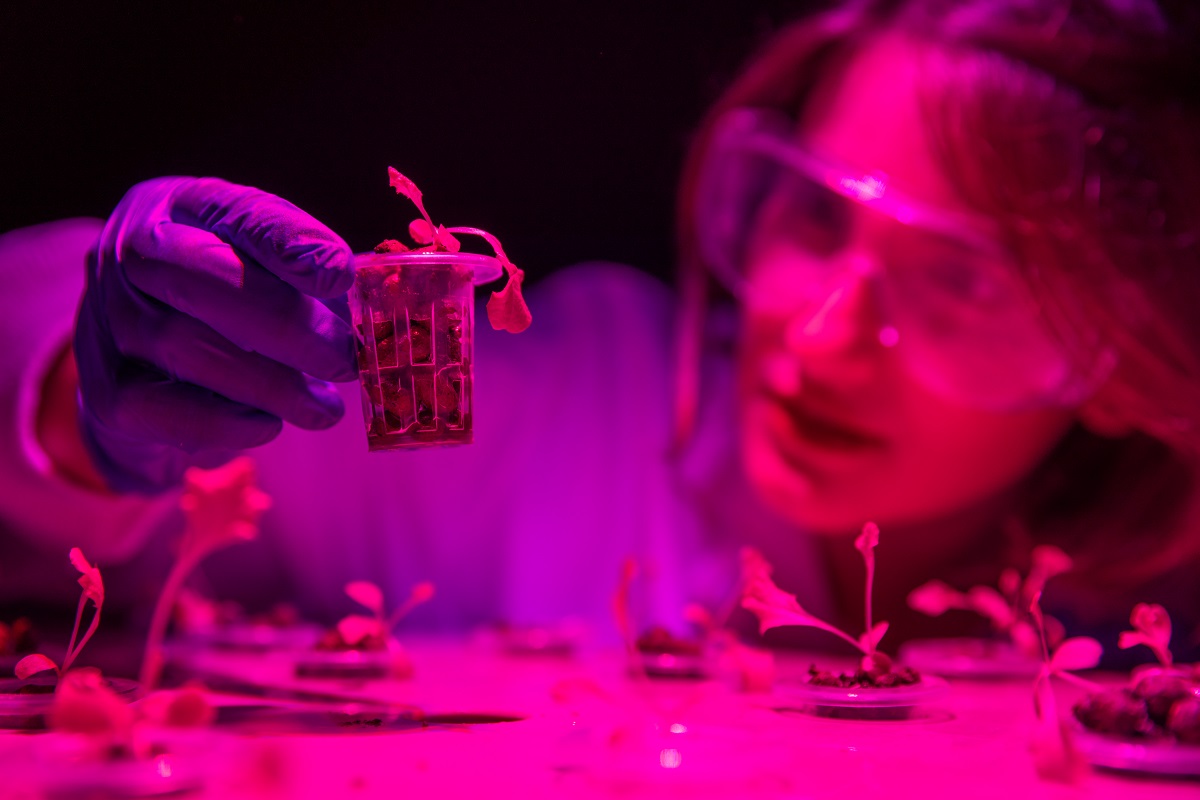A bright future for entrepreneurship at KAUST

KAUST master's degree graduate Vasiliki Kordopati ('17) turned a student project into a startup, founding Oaesis Lighting Systems on campus. Her startup is now based out of the University's Research and Technology Park. File photo.
By Aurelie Arsouze, KAUST Innovation
In the summer of 2017, then-KAUST master's degree student Vasiliki Kordopati (M.S. '17) enrolled in the "New Ventures and Product Innovation" elective course on the University's campus.
Each year, students are asked to choose a technology from a portfolio of University inventions and develop a plan to commercialize and bring their product to market. For Kordopati, a student in computer engineering, this was an opportunity to push herself out of her comfort zone. She chose a laser-based illumination technology for use in horticulture and indoor farming.
After completing the class, Kordopati decided to turn her student project into a startup and enrolled in KAUST's TAQADAM Accelerator program. She had never thought about entrepreneurship as a career path, but now, two years after the course, she is developing a pilot scale project in the KAUST Research and Technology Park and is in conversation with major farming suppliers.
"When I looked at my future, I didn't know that startup founder would be part of it," said Kordopati, now the CEO of Oaesis Lighting Systems. "This has been an incredible journey, from designing the technology all the way through to pitching around the world. I'm proud to be part of startup that has the potential to change the way we grow food in the future."

Alumna Vasiliki Kordopati (M.S. '17) created KAUST startup Oaesis Lighting Systems out of a student project focusing on laser-based illumination technology for use in horticulture and indoor farming. File photo.
A university entrepreneurial ecosystem
Universities play an important role in shaping entrepreneurs. When most people are asked to picture a startup founder, they envision a 20-year-old Mark Zuckerberg, who founded Facebook out of his Harvard dorm room. However, the real value of university entrepreneurship goes far beyond the billion dollar startup success story. The greatest impact universities have in facilitating entrepreneurship is by educating future leaders and founders like Kordopati.
Today, university best practice embeds entrepreneurship as part of the academic experience. This includes offering innovation and entrepreneurship-based curriculum and access to leadership, industry and capital. In many ways, universities are the ideal incubator, minimizing risk by offering innovators the room to experiment and fail.
KAUST is pioneering the next generation of deep technology entrepreneurs like Kordopati. As a purely science and technology-focused graduate university, KAUST furthers cutting-edge and transformative research across its four focus areas of food, water, energy and the environment.

KAUST regularly hosts on campus entrepreneurship events like the TAQADAM Accelerator program for budding entrepreneurs, fostering a startup ecosystem. File photo.
Now, KAUST has established a fully integrated startup ecosystem, providing access to training, mentorship, funding, lab and prototyping space. In less than a decade, the University has trained over 400 entrepreneurs and funded 56 startups with seed or early-stage investment.
Accelerating deep technology startups
One of the KAUST Entrepreneurship Center's flagship programs is the TAQADAM Startup Accelerator, a unique joint partnership between KAUST and the Saudi British Bank. Currently in its third cohort, 69 startups have been accelerated in the program, receiving grants of $20,000 zero equity funding, mentorship, lab space and access to critical industry, government and advisory connections.

The University's TAQADAM Startup Accelerator is a joint program between KAUST and the Saudi British Bank. File photo.

The team from KAUST startup UnitX pitches during the September 2018 edition of the TAQADAM Startup Accelerator program. Pictured from left to right: UnitX co-founders Kiran Narayanan, Ankita Shree and Ravi Samtaney. File photo.

The UnitX team works together on the University's campus. Photo by Ryan Yangyang.
University entrepreneurship in the community
KAUST is committed to fostering and growing an entrepreneurial ecosystem in the Kingdom with a mission that extends beyond the walls of the University.
"We are accelerating entrepreneurship within the entire Kingdom by educating entrepreneurs to create new ventures with high impact," explained Hattan Ahmed, head of KAUST's Entrepreneurship Center. "To date, we have trained over 8,000 innovators in Saudi Arabia with partnerships from 18 Saudi universities and have graduated 206 startups from our programs."

KAUST startup NOMADD secured a Series B investment from the Saudi construction company CEPCO in 2018. File photo.
For the nearly 60 percent of Saudi Arabia's population who are under 30 years old, the future is bright. A determined network of government, university and private industry work actively together to advance entrepreneurship in the Kingdom.

A young entrepreneur presents his innovative ideas during the University's 2018 TAQADAM Accelerator program. File photo.
Through its partnerships with industry and government and its unique on campus entrepreneurial ecosystem, KAUST is committed to leading the next generation of innovators into the future.

